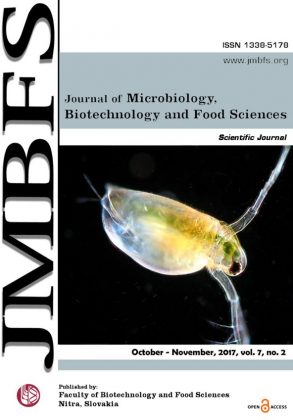KINETIC OF SUGAR CONSUMPTION AND ETHANOL PRODUCTION ON VERY HIGH GRAVITY FERMENTATION FROM SYRUP OF DATES BY- PRODUCTS (Phoenix dactylifera L.) BY USING Saccharomyces cerevisiae, Candida pelliculosa AND Zygosaccharomyces rouxii
DOI:
https://doi.org/10.15414/jmbfs.2017.7.2.199-203Keywords:
Ethanol, production, Yeasts, Sugar, Dates ‘syrup, Osmotic stressAbstract
Three yeasts, Saccharomyces cerevisiae, Zygosaccharomyces rouxii and Candida pelliculosa, were tested for ethanol production on dates’syrup. In batch fermentation, the ethanol concentration depended on the initial sugar concentration and the yeast strain. For an initial sugar concentration of 17.4°Brix, maximum ethanol concentration was 63 g/L during S. cerevisiae growth, higher than the amounts achieved during Z. rouxii and C. pelliculosa growth, 33 g/L and 41 g/L respectively. On 35.8°Brix initial sugar amount, only Z. rouxii was able to grow, resulting in 50 g/L ethanol production, showing an inhibitory effect on S.cerevisae and C. Pelliculosa due to the osmotic stress resulting from the high sugar concentration.Downloads
Download data is not yet available.
Downloads
Published
2017-10-01
How to Cite
Chniti, S., Jemni, M., Bentaha, I., Ali Shariati, M., Kadmi, Y., Djelal, H., Amrane, A., Hassouna, M., & Elmsellem, H. (2017). KINETIC OF SUGAR CONSUMPTION AND ETHANOL PRODUCTION ON VERY HIGH GRAVITY FERMENTATION FROM SYRUP OF DATES BY- PRODUCTS (Phoenix dactylifera L.) BY USING Saccharomyces cerevisiae, Candida pelliculosa AND Zygosaccharomyces rouxii. Journal of Microbiology, Biotechnology and Food Sciences, 7(2), 199–203. https://doi.org/10.15414/jmbfs.2017.7.2.199-203
Issue
Section
Food Sciences
License
Copyright (c) 2017 Sofien Chniti, Monia Jemni, Imène Bentaha, Mohammad Ali Shariati, Yassine Kadmi, Hayet Djelal, Abdeltif Amrane, Mnasser Hassouna, Hicham Elmsellem

This work is licensed under a Creative Commons Attribution 4.0 International License.
All papers published in the Journal of Microbiology, Biotechnology and Food Sciences are published under a CC-BY licence (CC-BY 4.0). Published materials can be shared (copy and redistribute the material in any medium or format) and adapted (remix, transform, and build upon the material for any purpose, even commercially) with specifying the author(s).





